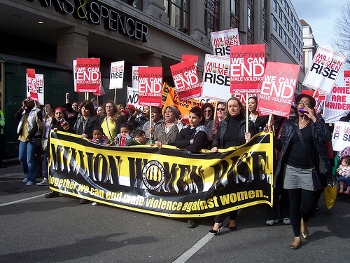 As women take on the brunt of the coalition government’s spending cuts, activist groups from all over the country are campaigning for gender justice through collective actions such as street protests, online media campaigns and community support groups. Mary Evans argues that we need to extend models of female dissent, and to do this we may need to extend our readings of the political to the fictional.
As women take on the brunt of the coalition government’s spending cuts, activist groups from all over the country are campaigning for gender justice through collective actions such as street protests, online media campaigns and community support groups. Mary Evans argues that we need to extend models of female dissent, and to do this we may need to extend our readings of the political to the fictional.
Over the past year, various studies have concluded that the present cuts in government spending in the UK will have a greater impact on women than men. A detailed audit undertaken by the House of Commons library showed that women would be shouldering three-quarters of the financial burden, a report by the Trades Union Congress noted that women would come to suffer disproportionately under public sector job losses, and the gender pay gap in the UK continues to represent a persistent injustice.

But far from accepting these damaging changes as unavoidable, a major resurgence in collective grassroots activism has emerged, representing a new form of female dissent that challenges new and ongoing forms of social inequality. The forms of resistance that women take today are far reaching and highly varied; a key example is the Women Against the Cuts movement which aims to fight spending cuts from a distinctly feminist perspective through campaigning on the street, online and at community levels. The ever growing London Feminist Network has also been vocal in the fight for fairer cuts, hosting ‘feminars’ on the impact of the recession on women, whilst the Million Women Rise campaign has brought the issue of domestic violence to the fore at a time when women’s shelters are having to close due to a lack of funding. All of these campaign movements and many more like them take advantage of a variety of new media and social networking platforms, such as Twitter and Facebook, to get their message out. Whether tweeting the location of the next campaign meeting or blogging on cuts in the local area, activists are making an impact and their campaigns are growing.
These strategies for dissent do of course differ from the key actions of feminist movements in the twentieth century but we can still identify these new collective actions as part of a longer history of female political dissent. Historically, women’s collective actions to secure full citizenship have been recorded and celebrated and these records are of course a powerful and important part of our collective history. The vocabulary of feminism in the 1970s invoked ideas about women as ‘hidden’ and ‘oppressed’, suggesting identifiable structures of power which exclude or marginalise women. Fighting battles around sexual rights, employment rights and reproductive rights, the vocabulary of second wave feminism centred on women as concealed or obscured, and actions concentrated on attempting to be heard.
Forty years on, there are new challenges to be faced in the policies of the present government. The first is the way in which many of the cuts in government grants to local authorities have been greater in existing areas of deprivation, and in areas of high Labour support such as Manchester and London. This ‘social kettling’ threatens to confirm, for future and present generations, the poverty of those women who are dependent on various forms of state provision, be it through funding or access to other services. At work is a conservative attitude to the state that prioritises the interests of the wealthy: namely that the state is a source of loss rather than gain. But feminist-driven activism is meeting this challenge, often at the forefront of campaigns highlighting the impact of cuts for those already suffering in poverty.
Secondly, it is important to challenge that domestication of the state and of politics that has been taking place since Margaret Thatcher: an account of national politics in which the state is transformed into a ‘household’, whose efficient management should be given to ‘good housewives’. This apparent identification of the state with the traditional role of women re-affirms, rather than lessens, gender divides since it presents a social model in which women’s dissent will only disturb the orderly household. An example of this is the Fawcett Society’s attempt to overturn the emergency budget of June 2010, which ended with them being refused permission to challenge the legality of the budget, despite the fact that an Equality Impact Assessment had not been carried out.
Thus in 2011 it is vital to consider new forms of dissent. Amongst those forms of dissent might be an engagement, not just with particular policies that will have a greater negative impact on women rather than men, but also with those models of the state that allow both entirely fictitious PR constructions of wealthy individuals (for example, that David Cameron is an ‘ordinary bloke’) and policies in which the interests of women are being systematically ignored.
This blog is based on the lecture ‘Gender, Words and Power: meanings of inequality at a time of neo-liberalism’, given by Mary Evans on Monday 17th January at the LSE. Click here for more details. Click here to download a podcast of the event (MP3, 33 MB)
See also from this blog:
- Book Review: Not so different after all: why Hegel and feminism make unlikely bed fellows – Amy Watson
- Spending cuts and single parents: how vulnerable families stand to lose the most under the coalition’s public service cuts – Amy Mollet
- Lack of women at Westminster – Pippa Norris
- The government’s proposed cuts to the housing benefit will force 130,000 families out of their homes and add to the UK’s growing homeless population – Avery Hancock
- Slashing the welfare budget versus “We are all in this together”. The cumulative effect of cuts is more serious than has yet been admitted – Jane Tinkler
- Cuts to the Department of Work and Pensions’ overhead costs threaten the promised benefits of welfare reform – Avery Hancock
Click here to respond to this article.
Please read our comments policy before posting.







This is the most perfect example of theoretical punditary based on insubstantial facts!
Far from revitalising feminism the centralism and top downism of politically motivated funding by the Labour Government has left a movement of feminists that are disempowered, lacking in self confidence and without the resource and depths of a network of locally based women’s groups to do anything effective.
Media blather about social media happily disguises that what passes for feminism is now a professional career path for women from white middle class backgrouns to stage events that promote a) themselves b) the organisation they identify with (at the expense of a concept of a wider network of interlinking groups c) and a desparate need to ensure that feminism / feminists conform to their narrow definitions of what that means.
Unlike Women’s Liberation (the 2nd Wave) whether through an accident of history or a geuinely ground breaking method of working, women are not empowered to work together with other women to challenge the patriarchy whether at home, in their workplace or in government. Feminism is now practicised in the same way as hobbyist gave and evening to induldge in inactivities they enjoy but do not disturb or challenge their daily life.
A few chief executives of labour favoured organisations may have prospered, and a few media savvy wannabe journalists may have got their name known, but this individualistic advancement has been at the expense of the wide based, more representative movement that empowers and enables women to challenge on their own terms, not passibely sign up to a proscribed route chosen behind closed doors by a few elitists.
Please do your research better. Not just rely on google. The internet revolution is only virtual.